Exploring 4 different CCK types: Third Culture Kids, Domestic Third Culture Kids, Educational Cross-Cultural Kids and Children of Borderlanders
What is a Cross-Cultural Kid?
A Cross-Cultural Kid (CCK) is someone who has been significantly influenced by two or more cultural environments during their developmental years. The CCK Model is the work and research of Ruth Van Reken.
Welcome to part 3 of the CULTURAL MOSAICS series where we closely look at the Cross-Cultural Kids (CCK) Model by Ruth Van Reken, analyzing each category more in depth, going well beyond the realm of Third Culture Kids, where it originated.
This CULTURAL MOSAICS series on Cross-Cultural Kids (CCKs) was originally posted on Instagram in September 2023 as a collaborative project by Beatriz Nour @inbetweenish.pod and myself, Wiebke Homborg @chameleon_coaching. If you have Instagram, we encourage you to check out the original posts for its great visuals, audios, reels and storytelling.
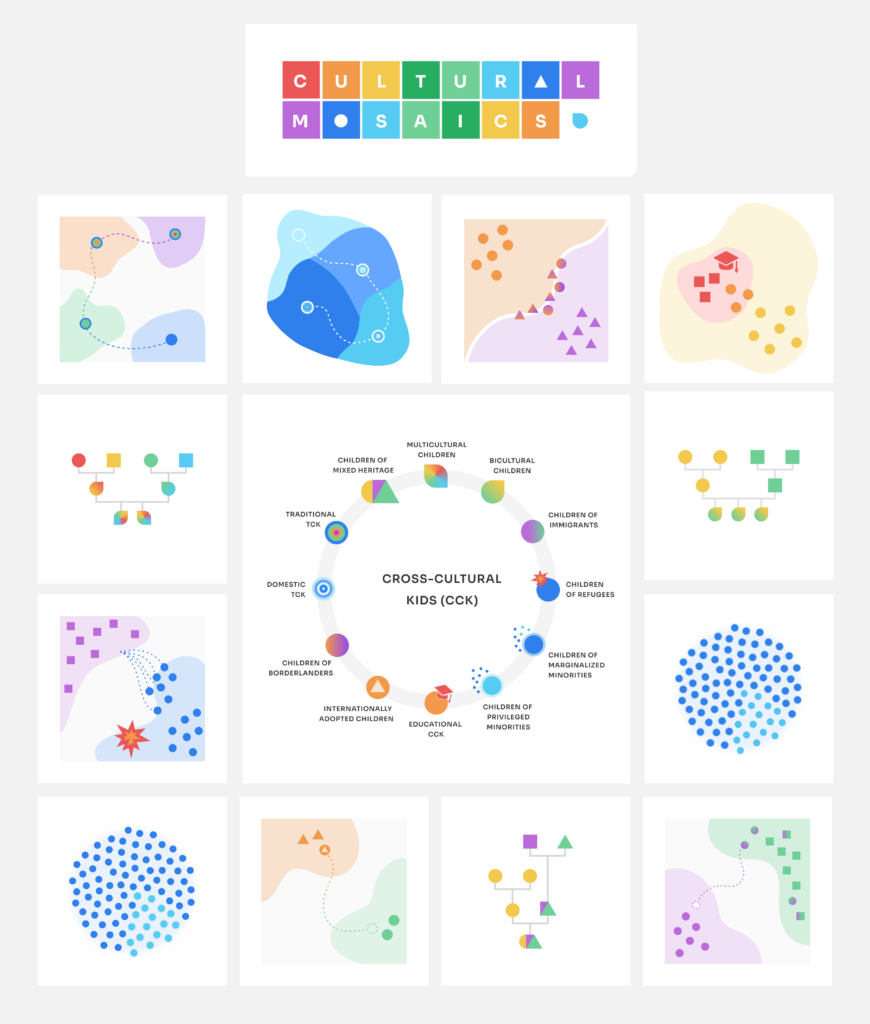
In this article, we introduce the following CCK types:
- THIRD CULTURE KIDS
- DOMESTIC THIRD CULTURE KIDS
- EDUCATIONAL CROSS-CULTURAL KIDS
- CHILDREN OF BORDERLANDERS
For a general introduction to CCKs, check out part 1 of this blog post series.
For more details on other CCK types, go to part 2 and part 4.
Explore how you can be a genuine mix of several types in part 5.
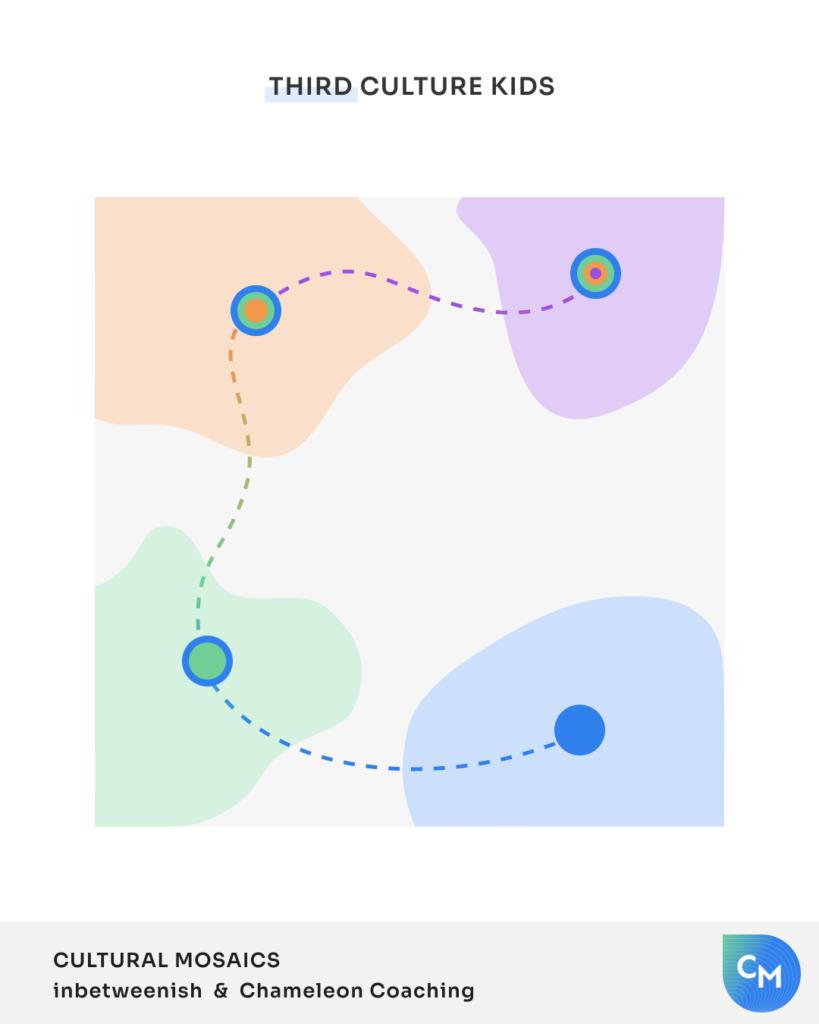
Third Culture Kids
Definition
A Third Culture Kid (TCK) is someone who spends a substantial portion of their formative years accompanying their parent(s) to countries other than the parent’s passport country, often due to a parent’s work.
TCKs often develop a distinct cultural identity influenced by their parent’s occupation (e.g. diplomatic, military, missionary, corporate). There are also TCKS that are children of self-organized expatriates.
Unique experiences, benefits and challenges
Third Culture Kids (TCK) are perhaps the most well-known category of the Cross-Cultural Kid model. TCKs were actually the very first category to be observed and named as such in the 1950s by the sociologist and anthropologist couple, John and Ruth Useem. The concept was further developed and researched by David C. Pollock and Ruth Van Reken since the 1990s (more on that in a future post).
The benefits of growing up as a TCK are multiple. TCKs often develop an expanded worldview gained from their multiple relocations, exposure to different cultures, and often times, an international school environment. This leads to a great appreciation for other cultures and a developed sense of cultural and emotional intelligence. Often times, they speak several languages and they can develop remarkable adaption abilities. A TCK life can lead to children and teenagers becoming more comfortable socially in varying environments, and it can allow them to become a bit of a cultural chameleon.
“Do you want the long version or the short version?”
Even though many TCKs come from a privileged background, their highly mobile lifestyle comes at a price. TCKs may struggle with a sense of belonging as they navigate multiple cultural influences. Growing up in this lifestyle will likely lead to cultural confusion and mixed loyalties. The loss of a stable foundation can leave TCKs searching for a sense of home and struggling to establish a solid cultural identity. A common sentiment amongst TCKs is rootlessness and restlessness.
Although many TCKs attend international schools, it’s not a rule of thumb. Frequent moves and constantly changing peers make it challenging to form stable social connections and develop a consistent sense of self. They may often feel misunderstood and have difficulties forming deep and lasting relationships. One of the struggles TCKs may face in silence is unresolved grief and loneliness, as they battle an inner identity crisis: where do I belong?
What parents can do
Thankfully, there are many ways parents can address these challenges and support their TCK children.
Often times, parents of TCKs may not fully relate to the struggles of growing up in this lifestyle, so awareness is key to understanding a child’s experience. Being present and building a strong sense of stability within the family is of utmost importance. Parents of TCKs, who are often expats, can model healthy coping strategies and hold space for safe conversation around this nuanced topic.
For TCKs and Adult Third Culture Kids it is helpful to engage in self-reflection and seek support from fellow TCKs or multicultural communities. It’s important to find ways to embrace their unique background and celebrate the diversity of their experiences. Building a support network of individuals who understand these experiences can provide TCKs with a sense of belonging and validation.
Think about it
- When asked: “Where is home?”, TCKs struggle… Do you mean where I was born or where I live now?
- What impact does TCK life have on a child’s identity formation?
- If you are a TCK, what are some of the advantages and challenges you have encountered, and how have these experiences contributed to your personal growth and resilience?
Podcast Recommendation
the inbetweenish pod, episode “💭 reflections on: Third Culture Kids and Cross-Cultural Kids explained”
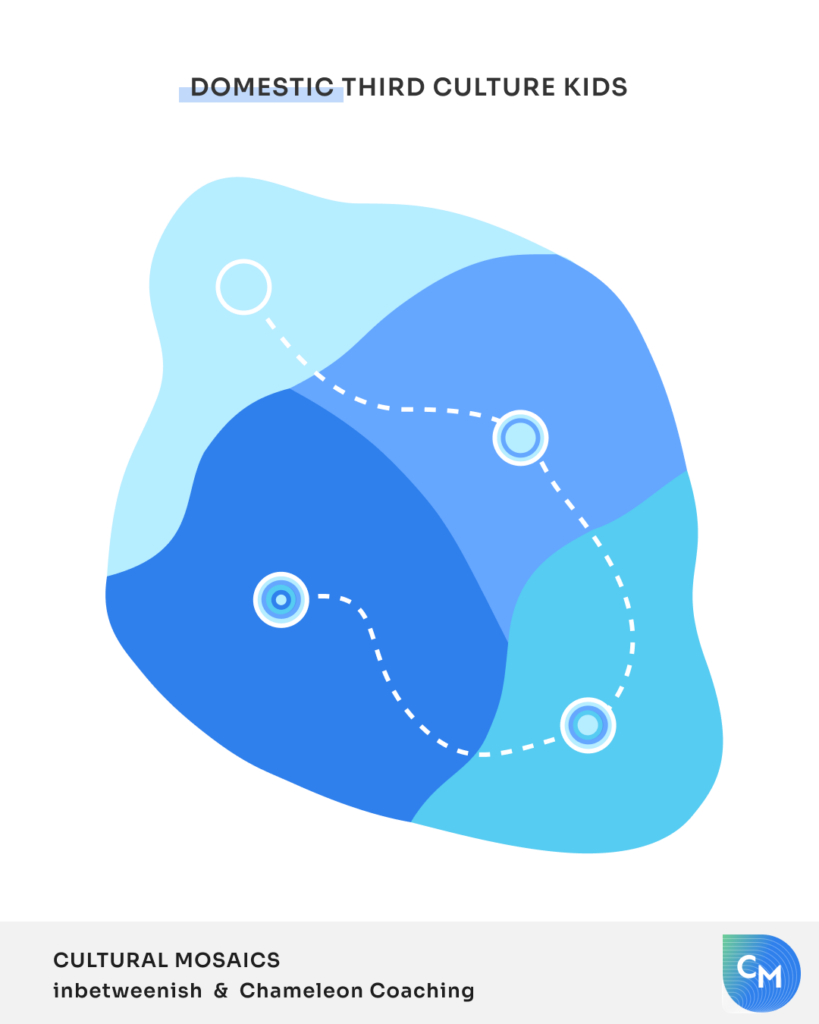
Domestic Third Culture Kids
Definition
Domestic TCKs are individuals who move (frequently) within their own country, from one subculture to another.
Examples: A military family in the United States that moves every 2 – 3 years. An Indian family that moves to different states and regions every couple of years.
Unique experiences, benefits and challenges
The Domestic TCK might be one of the lesser known CCK types. In the CCK context, we tend to think mainly of national cultures, but many countries offer a rich variety of sub-cultures within their own borders, including different languages, religions, cuisines, and school systems.
“Compared to a lot of my Indian friends, I feel like I’ve really seen the diversity.”
Just like the classical TCK, domestic TCKs benefit from their immersion in different sub-cultures, growing up to be open, adaptable, flexible and curious. Due to their exposure, they become interculturally competent and proficient in several languages or dialects, depending on the country they live in. Essentially, they become cultural chameleon, easily code-switching between different cultural contexts.
Domestic TCKs face similar challenges as other CCK types, though often without the corresponding acknowledgement that international moves receive. They may struggle with educational transitions, rootlessness, and restlessness. Domestic TCKs can also suffer from cultural confusion and the complexity around identity and belonging. Their frequent moves lead to frequent goodbyes, and can make it difficult to form deep connections with others before having to start over again in a new city or region.
What parents can do
It’s essential for parents and educators to provide support and guidance to domestic TCKs. Encouraging open discussions about identity and cultural experiences can help them navigate these complexities. Additionally, fostering a sense of pride and confidence in their unique cultural perspective can empower domestic TCKs to embrace their identity and see it as a strength rather than a source of confusion or insecurity.
Think about it
- Which countries do you know that have a rich cultural diversity (language, food, music, religion)?
- Why do some countries seem to manage cultural diversity better than others?
- Do you know a person that you would consider as a domestic TCK? Are they aware of this term?
Podcast Recommendation
the inbetweenish pod, episode “🌶️ the diversity that brings us together — with Aakshi”

Educational Cross-Cultural Kids
Definition
“Educational Cross-Cultural Kids are children who attend a school with a different cultural base from the one they return to at home each night.” (Pollock/Van Reken, 2017)
Examples: Attending international or boarding schools in their home country. Being sent abroad for education, on their own or with a parent (aka parachute or satellite kids).
Unique experiences, benefits and challenges
Educational Cross-Cultural Kids (CCK) come in many forms; there are two main sub-categories: children who live in their home country and children who are sent abroad, under varying circumstances. Educational CCKs that study in their home country typically attend international schools near their home, but sometimes they are also sent to boarding schools in other regions or cities within their home country. Conversely, Educational CCKs that are sent abroad for education also come in two formats: Parachute Kids are children who go abroad to boarding school to study entirely on their own, and Satellite Kids are children who go abroad with a parent/family member for the sole purpose of education.
Benefits for all: develop intercultural competence, tend to become fluent in other languages, and learn to navigate different cultural contexts as they gain a broader worldview. Often times, these children grow up in a multicultural environment through the diversity their peers and educators bring to the table. Educational CCKs often have access to strong and well recognized academic programs which can open doors to higher education upon graduation.
Boarding School & Parachute Children Challenges: stress of adapting to a new culture is paired with grief over the separation from their parents/families. At the same time, they also have to meet high academic expectations. This greatly affects their psychological and emotional well-being. Common feelings of loneliness, sadness, anger, alienation and homesickness can become precursors for the development of serious psychological and behavioral problems. It can be hard for these children to express challenges they may be facing.
“It felt really hard to navigate those things, like as a child. Just young kids trying to fit in and form mini-groups.”
International School kids Challenges: they follow a curriculum based on Western perspectives. This can put Western culture on a pedestal while degrading, or paying less importance to the child’s own culture. With international peers, it can be challenging to fit in at times and peers may relocate frequently following their parents’ careers. Sometimes children attending international schools may be getting an education in a language their parents do not speak, which means they cannot lean on them for academic support.
What parents can do
All Educational CCKs may experience cultural identity confusion, bullying, discrimination or racism at times which some may internalize. Parents can help their children by listening to their struggles, acknowledging their experiences, being present and by showing support. Build rapport with school counselors and teachers to better understand and raise awareness of the situations Educational CCKs may be facing. If need be, it can be a good idea to seek psychological support if children are facing trouble adapting and navigating these different cultural contexts.
Think about it
- In your own experience, are international schools “culturally balanced”?
- What unique challenges might Educational CCKs face when transitioning between different cultural environments?
- Do you know any educational CCK’s? It can be very lonely experience. How can you support them?
Podcast Recommendation
the inbetweenish pod, episode “🐘 identity crisis: who am I? — about your host”
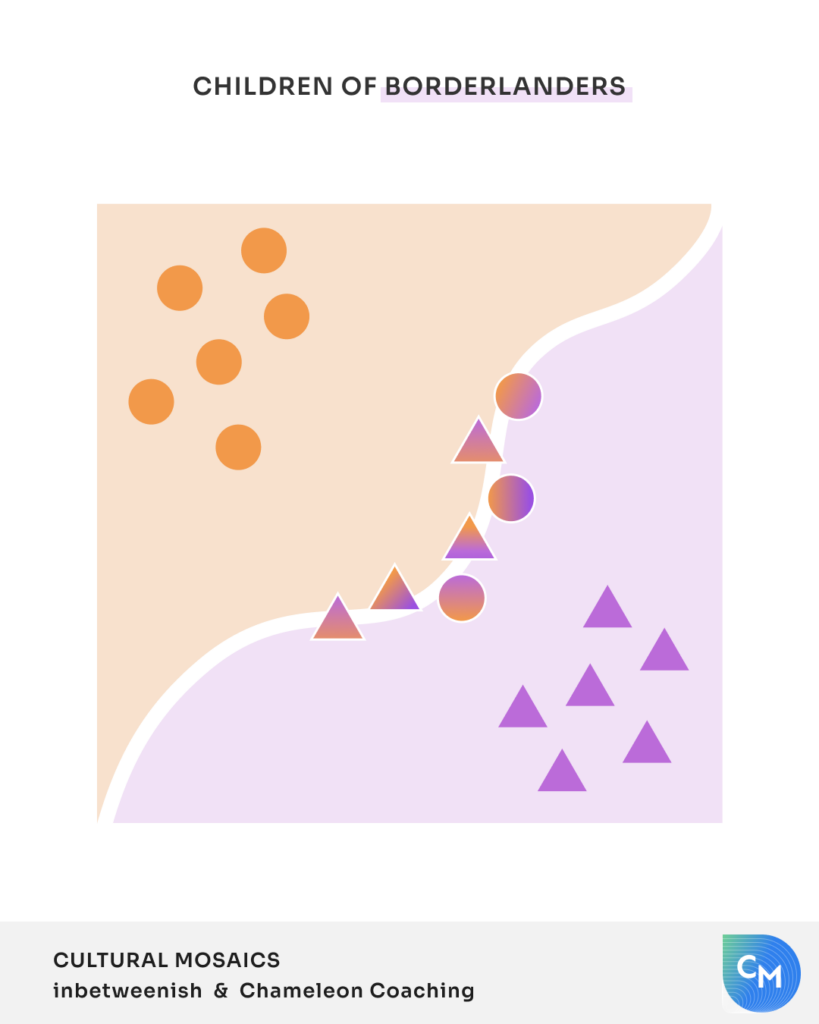
Children of Borderlanders
Definition
Children of borderlanders cross borders on a regular, sometimes daily basis: going to school or having parents that work across national borders.
Examples: Disputed borders such as the Palestinian/Israeli border. Amicable borders such as the French/German/Swiss borders and the cities of Strasbourg (France) or Basel (Switzerland).
Unique experiences, benefits and challenges
Crossing borders to attend school can broaden students’ horizons by exposing them to diverse cultures and educational opportunities, but it can also pose logistical and cultural challenges, including issues related to transportation, language barriers, and cultural adaptation.
The experience varies quite drastically based on the type of border: disputed borders, amicable borders, open borders, heavily controlled borders, etc. Borderlanders can foster social cohesion or quite the opposite, become fierce nationalists.
What parents can do
We can support children of borderlanders by investing in cross-border educational initiatives, addressing logistical challenges related to border crossings, and promoting cultural exchange and cooperation to enrich their educational experiences.
Think about it
- What type of borders does your home country have?
- What about other countries you’ve lived in?
- Do we really need borders?
Are you a Child of Borderlanders?
Disclaimer: It’s been challenging to get information on this CCK type, so the information we have is limited. If you identify as a child of borderlanders, please reach out to us, we would love to know more about your experience.
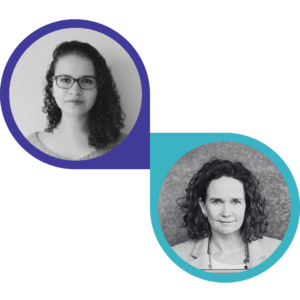
Hi, I’m Beatriz, the host of the inbetweenish pod, where I invite others to reflect on the meaning of belonging, the feeling of home, and I ask questions like, do you ever feel stuck between worlds?
And I’m Wiebke, from Chameleon Coaching. As an intercultural trainer and coach, I am passionate about supporting and empowering individuals on their journeys across cultures.
Stories of Belonging
Tune into Beatriz’ podcast where she invites inspiring and diverse CCKs to a deep and heartfelt conversation. Discover new perspectives and learn from their stories around identity struggles as well as their quest for belonging and defining where home is.

Explore your multicultural identity with me
I have supported many CCKs and global nomads on their inner journey to more clarity about their multicultural identity. Let me help you embrace your inner diversity and find true belonging within yourself and with others.

